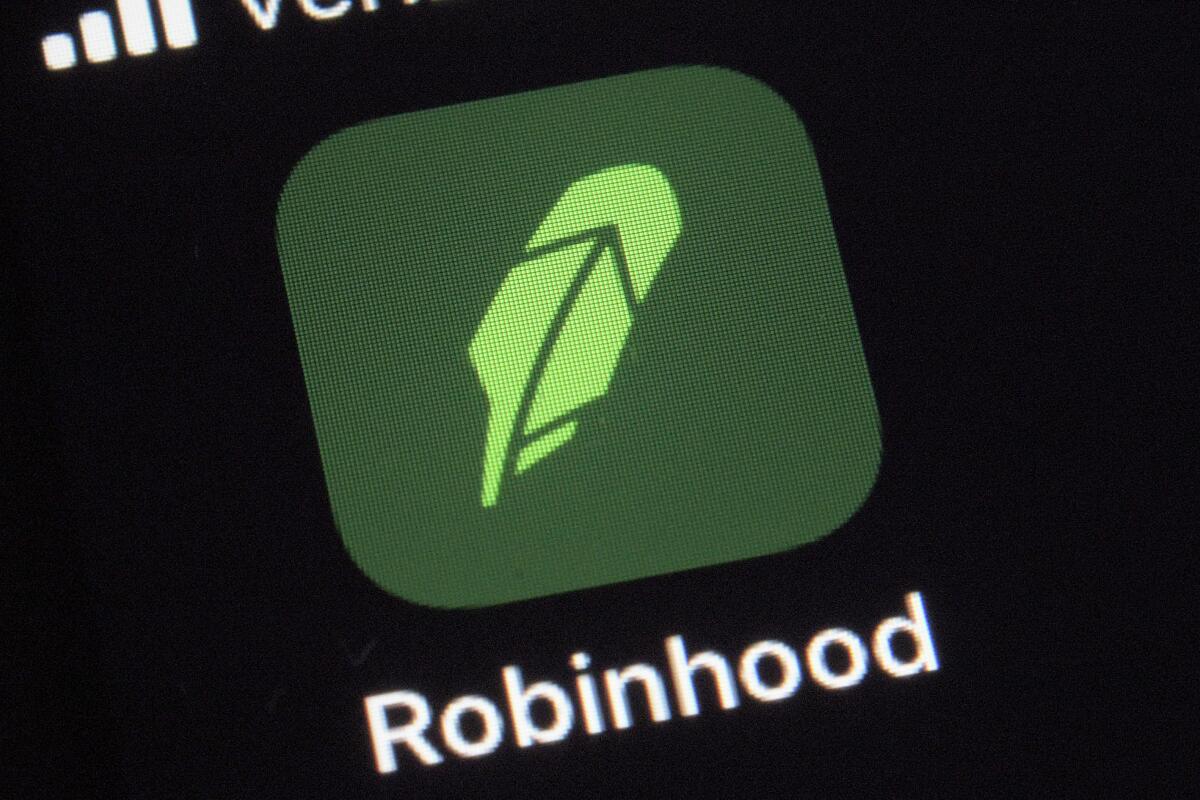Robinhood, Citadel reject conspiracy claims that they halted ‘meme’ trades

- Share via
Robinhood Markets and Citadel, central players in the GameStop Corp. saga that gripped markets last month, are using congressional testimony to push back against conspiracy theories circulating in Washington that they coordinated to restrict retail investors from adding to their bets.
Robinhood Chief Executive Vlad Tenev said in written testimony for a Thursday House Financial Services Committee hearing that the brokerage halted trades to meet demands from its clearinghouse. Claims it sought to help hedge funds are “absolutely false and market-distorting rhetoric,” he said.
Ken Griffin, Citadel’s billionaire founder, said in his prepared remarks that he didn’t learn Robinhood had barred GameStop buy orders until after the restrictions were publicly announced. “I want to be perfectly clear: we had no role in Robinhood’s decision to limit trading in GameStop or any other of the ‘meme’ stocks,” said Griffin, whose financial empire includes a hedge fund and massive market maker Citadel Securities.
The virtual hearing will offer lawmakers their first chance to grill executives involved in the recent stock market frenzy, which alarmed both Wall Street and Washington. Chairwoman Maxine Waters (D-Los Angeles) has said she wants to scrutinize all players tied to the tumult to assess whether new rules are needed to curtail the influence of hedge funds and to strengthen guardrails for smaller investors.
Gabe Plotkin, a hedge fund manager whose firm took heavy losses during last month’s Reddit-fueled trading, plans to tell Congress that he was “humbled” by the experience.
“Melvin Capital played absolutely no role” in the decisions of trading platforms to limit the buying and selling of GameStop shares, according to Plotkin’s written testimony. “In fact, Melvin closed out all of its positions in GameStop days before platforms put those limitations in place.”
Plotkin used his testimony to clarify that Melvin Capital wasn’t “bailed out” by the $2.75 billion it received from Citadel, Point72 Asset Management and others last month. Even though the firm was going through a “difficult time,” it always had adequate funding and wasn’t seeking a cash injection. Citadel proactively reached out to become an investor, seeing it as an opportunity to “buy low,” Plotkin said in his remarks.
Melvin Capital lost billions closing out its GameStop position and reducing other wagers. The firm’s assets fell to about $8 billion in January after starting the year with $12.5 billion.
Keith Gill, a Reddit user known as “Roaring Kitty” who is credited with inspiring GameStop’s rally, will testify that he was merely an individual investor using public information to study companies. Gill, one of the most influential participants pushing GameStop on the WallStreetBets Reddit forum, was sued this week in Massachusetts for misrepresenting himself as an amateur investor and profiting by artificially inflating the price of the stock.
“I did not solicit anyone to buy or sell the stock for my own profit,” Gill said in his testimony. “I did not belong to any groups trying to create movements in the stock price. I never had a financial relationship with any hedge fund. I had no information about GameStop except what was public. I did not know any people inside the company, and I never spoke to any insider.”
Jennifer Schulp, director of financial regulation studies at the Cato Institute and a late addition to the hearing’s lineup of speakers, will testify that rule changes may not be warranted in light of the minimal impact on markets. “By no means, though, should the GameStop phenomenon result in changes that restrict retail investors’ access to the markets,” she said.
In his testimony, Tenev described the morning of Jan. 28, when the brokerage halted purchases of GameStop and other “meme stocks.” At 5:11 a.m., the industry’s clearinghouse — a body that manages systemwide risk — demanded a deposit of more than $1 billion from Robinhood, he said. Because the sum demanded was even larger than the amount of net capital the online brokerage had on hand, an additional charge of $2.2 billion was slapped on top, bringing the total amount due to about $3 billion. Robinhood complied with its net capital requirements at all times during this period, the company says.
Around 7:30 a.m., in a scramble to meet the requirements, Robinhood decided to stop customers from buying GameStop and other volatile stocks. The clearinghouse then agreed to waive the entire $2.2-billion charge it had initially added, according to Tenev’s account. With an additional $737-million deposit that morning, combined with the amount Robinhood had already posted at the clearinghouse, the broker met its requirements for that day.
To help prevent last month’s events from happening again, Robinhood has called on regulators to make the settlement period for stock trades instantaneous. Citadel’s Griffin also called for a shorter settlement time.
Griffin, whose Citadel Securities pays Robinhood and other brokerages for the right to execute their customers’ orders, said the current two-day requirement “exposes firms to more risk in the time between execution and settlement, requiring higher capital levels.” He also advised that clearinghouse capital requirements be made more transparent.
Bloomberg writers Daniel Flatley and Annie Massa contributed to this report.






